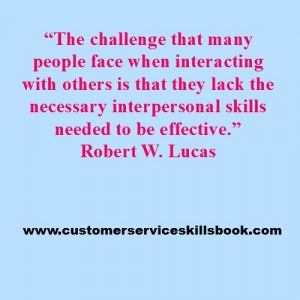Evaluating Your Nonverbal Communication
When Dealing With Customers
To get a better idea of how you present yourself to customers nonverbally, ask a co-worker to use the following guidelines and evaluate your nonverbal communication during a service transaction with a customer. Once it is over, spend some time having them provide feedback on how well you did.
Body Language. How do your body posture and positioning send a relaxed positive (e.g. confidence and self-assurance) or tense negative (e.g. uncertain, confused, or not confident) message about you?
Facial Expression. Does your face say, “Hello, Welcome, I am able and ready to serve you,” or does it show a bored disinterested employee who is going through the motions of providing service?
Eye Contact. Are you making appropriate and adequate eye contact to show interest without causing possible discomfort or offense?
The Tone of Voice. Does your voice project a smiling professional who sounds even-paced, comfortable and confident?
If you answered “no” or “unsure” to any of these questions, think about getting a communication coach or enrolling in training programs that can help evaluate and improve your nonverbal skills.
Failure to improve your skills or project a positive customer service image can lead to perceptions of your poor performance or bad attitude. This can result in:
- Your termination.
- Negative word-of-mouth publicity.
- Customer complaints.
- Loss of brand and customer loyalty.
- Loss of business for your organization.
For additional ideas and techniques for improving your nonverbal communication when interacting with others, get copies of Customer Service Skills for Success and Please Every Customer: Delivering Stellar Customer Service across Cultures.
About Robert C. Lucas
Bob Lucas has been a trainer, presenter, customer service expert, and adult educator for over four decades. He has written hundreds of articles on training, writing, self-publishing, and workplace learning skills and issues. He is also an award-winning author who has written thirty-seven books on topics such as, writing, relationships, customer service, brain-based learning, and creative training strategies, interpersonal communication, diversity, and supervisory skills.
Additionally, he has contributed articles, chapters, and activities to eighteen compilation books. Bob retired from the U.S. Marine Corps in 1991 after twenty-two years of active and reserve service.
Bob Lucas B.S., M.A., M.A, CPLP is the principal in Robert W. Lucas Enterprises, Inc and an internationally-known author; learning and performance professionals. He has written and contributed to numerous books on the subject of customer service skill training.
He regularly conducts workshops on creative training, train-the-trainer, customer service, interpersonal communication, and management,
and supervisory skills.
Learn more about Bob and his organization at www.robertwlucas.com and follow his blogs at www.robertwlucas.com/wordpress,
www.customerserviceskillsbook.com, and www.thecreativetrainer.com. Like Bob at www.facebook.com/robertwlucasenterprises









